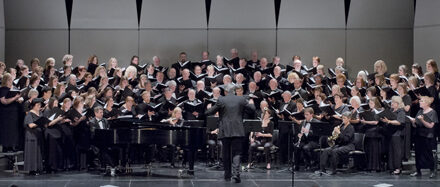In the 1930s, I would have had to go to Howard Hanson‘s annual Festival of American Music in Rochester, NY, to hear a program featuring only American 20th century composers. But in 2014, I traveled just fifteen minutes to Warren Wilson College in order to hear such a concert as part of this year’s Swannanoa Chamber Music Festival. The five composers were Leonard Bernstein, Wallingford Riegger, Inessa Zaretsky, Cole Porter, and Samuel Barber, and the performers were Felicia Moore, soprano; Inessa Zaretsky, piano; and a woodwind quintet (George Pope, flute; Cynthia Watson, oboe; David Bell, clarinet; Lynn Hileman, bassoon; and William Hoyt, horn).
Over more than 30 years, Leonard Bernstein wrote small piano pieces entitled Anniversaries, 33 in all. Nine of these, arranged by George Pope for woodwind quintet, opened the concert. The first piece, in honor of Bernstein’s wife Felicia Montealegre,was sedate and formal. The third piece, for David Diamond, used modal harmonies reminiscent of Diamond’s excellent Third Symphony (written just three years before Bernstein composed this birthday present). The next frenetic piece was for his teacher Helen Coates, while the piece for Bernstein’s classmate and friend Lukas Foss imitated the balletic nature of Foss’s music. These are skilful evocations by Bernstein in honor of (and later in memory of) his colleagues and friends.
While Wallingford Riegger doesn’t match twelve-tone masters like Alban Berg. it was good to hear his Concerto for Piano and Wind Quintet, Op. 53. The third movement was perhaps the most interesting, with varying percussive piano motifs that built tension, sometimes against a contrasting lyrical horn background. The concluding measures include a pregnant silence followed by two repetitions of the five-note motif that the pianist had been manipulating earlier in the movement. This was a convincing presentation by Zaretsky and the quintet.
The third piece was Inessa Zaretsky’s five-movement Sandburg’s Corner, based on five poems by the American poet who lived for many years in Flat Rock, NC. The third (central) movement is for flute and piano, while the other four are for soprano with piano accompaniment. George Pope played flute (and piccolo) while the composer played the complex piano part, which includes glissandi and tone clusters as well as hand-plucked and hand-brushed strings in the third movement. This is the second time I have heard Zaretsky’s compositions, and they deserve notice.
The soprano was Felicia Moore, who deserves a paragraph to herself. This New York-based vocalist has a powerful upper register and a dark richness of timbre that is unusual in a dramatic singer this young. At times, one is reminded of the lushness of the best mezzo-sopranos. Also, one felt she was matching her sound to the intimate acoustic space of the Kittredge Theatre and holding in reserve even more power to let loose in a large opera house. Here is an impressive young artist to watch for in the future.
The final work on the program was the premiere of a chamber music arrangement by Bill Hoyt of Samuel Barber’s brilliant work for soprano and chamber orchestra, Knoxville: Summer of 1915. Ms. Moore showed dramatic presence in presenting various phrases of the James Agee text such as “enchants my eardrums” and “stars are wide and alive.” She clasped her hands as if in prayer as she delivered the late passage “May God bless my people.” Hoyt’s arrangement makes good use of the full scope of the woodwinds, with occasional and appropriate introduction of alto flute and English horn in place of the usual soprano flute and oboe. The work was very well received by a modest-sized but very attentive audience.
This admirable festival continues through July 29. For details, see our calendar.











